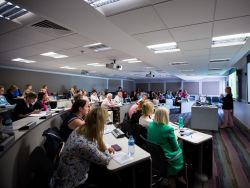A volunteer visa falls under the category 'D', long stay, visa, i.e more than 90 days. This visa must be applied for at least 3 months before you travel to Ireland, please note that extra time may be needed in order to organise other documents such as proof of finances, medical insurance and proof of sponsorship.
You must apply for and receive a long stay visa before you travel. If approved you can, for example, work with a charity, voluntary or non-profit organisation that has sponsored your visit. This stay is for a time period of over 3 months and no more than 2 years. As a volunteer in Ireland, you cannot bring your family to stay with you. Your family can, however, apply for their own visas independently.
EU resident
Applications for an Irish volunteer visa must be made from the EU/EEA country that you are from or are a legal resident of. If approved an Irish volunteer visa will allow you to undertake a volunteering role within an eligible organisation for up to 2 years, an option of a 3rd year can also be applied for.
Non-EU resident
Non-EU, EEA and non-Swiss citizens can only apply for permission to be a Volunteer in Ireland if you have prior approval from the INIS, Department of Justice and Equality, Irish Naturalisation and Immigration Service.
Who Can Volunteer in Ireland?
You can only apply to Volunteer in Ireland if you:
- Are a non EU/EEA and non-Swiss citizen or have prior approval from the INIS.
- Are aged 18 or older.
- Have been offered volunteering work by an eligible organisation.
- Can be financially supported, throughout your stay, by an eligible organisation.
- Can provide police clearance certificate or equivalent, not older than 3 months.
- Provide a child and/or vulnerable clearance (depending on your role) from An Garda Síochána.
- Have proof of medical insurance from a company authorised by the Health Insurance Authority of Ireland to cover you for the duration of your stay.
Popular types of volunteering in Ireland
Examples of Volunteer Work in Ireland:
- Youth Work
- Befriending/Mentoring
- Administrative/Office Work
- Arts (Music/Drama/Crafts)
- Sports/Outdoor Activities/Coaching
- Teaching/Tutoring/Supporting Learning
- Counselling/Listening
- Events and Stewarding
- Charity Work
There are an estimated 3,000 volunteering opportunities across Ireland at any one time. For further information on Volunteering In Ireland see volunteer.ie.










